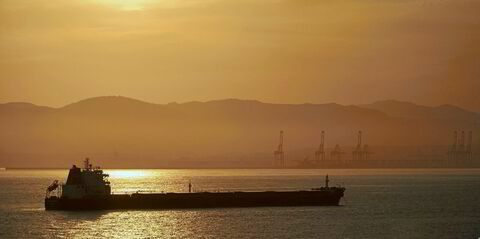The debate over use of scrubbers to meet new IMO emissions laws is heating up, with a detailed defence from a shipowners group and further attacks by opponents.
The support comes from a coalition of scrubber-using owners known as the Clean Shipping Alliance 2020.
The group, through spokesperson Hamish Norton of Star Bulk Carriers, is challenging criticism of the exhaust-cleaning devices from various quarters, including shipowners such as Paddy Rodgers of Euronav.
The alliance is also rebutting comments in a 1 November opinion column by TradeWinds Editor-in-Chief Julian Bray, who wrote that while there has been inadequate research to date, scrubber-using owners are likely to find themselves on the wrong side of history.
The debate concerns open-loop scrubbers, which reduce sulphur and other pollutants in air emissions but dump them in the oceans through wash water.
Norton is president of Greek owner Star Bulk Carriers, which has opted for scrubbers across its 111-vessel fleet. As the spokesperson for the alliance on the issue, he argues that science to date supports its position.
“There’s no free lunch,” Norton says. “Someday, ships will burn something other than oil and there will be a better solution. But, as long as we drill for oil, open-loop scrubbers may be the single most environmentally friendly way to burn fuel oil.”

In a further ratcheting up of rhetoric over the issue today, Paul Pathy, president and chief executive of Fednav, said “he did not believe in scrubbers” in a forthright attack on the motivations of those installing them.
“They are not good for the environment,” he told the TradeWinds Shipowners Forum in Tokyo. “They are bad for the planet.”
He added: “If you got all these shipowners in the room they would have to admit that installing scrubbers is not an environmental decision, it’s a business decision.”
Fednav owns a fleet of 63 mainly Japanese-built bulkers, and charters in more.
Whether to install scrubbers and continue to use high-sulphur fuel oil or forgo them and switch to low-sulphur fuel oil has become a divisive issue ahead of the 1 January 2020 IMO deadline.
A majority of owners has either opted against the exhaust-screening devices or not yet decided whether to use them.
Rodgers has been one of the most forceful critics. This week, he took his case to the Daily Mail newspaper in the UK, comparing scrubber use to Volkswagen’s “dieselgate” scandal.
“I think when the public wakes up to the industrialisation of pollution from the atmosphere to the ocean, the industry will face as big a backlash as VW did during its emissions scandal,” Rodgers told the newspaper.
Vast investment
Yet a powerful minority — including many of the larger publicly listed companies — has chosen scrubbers and collectively invested hundreds of millions of dollars in the process.
Besides Star Bulk, the Clean Shipping Alliance includes names such as John Fredriksen’s Frontline and Golden Ocean, Idan Ofer’s Eastern Pacific, Torm and the Navig8 Group.
Norton says some in the Clean Shipping group have been using scrubbers for more than 10 years and “have taken the time to do the research to understand the air and water emissions related to these systems”.

While TradeWinds cited a lack of convincing research as to just how harmful ocean contamination might be, Norton argues such research does exist.
He leans heavily on a 2012 Danish Environmental Protection Agency report, which “showed the composition of wash water discharged by scrubbers is well within current environmentally acceptable limits and considerably below levels that would merit concern”.
Sulphur already exists in the ocean as sulphate at fairly significant levels without being harmful, Norton contends. Anything added through wash water would be miniscule in comparison, he says.
If you took all the sulphate currently in the water and could spread it into a layer, it would be five feet thick. If you added all the sulphur known to man in coal and oil deposits, it would in comparison have the thickness of a sheet of paper
“If you took all the sulphate currently in the water and could spread it into a layer, it would be five feet thick,” Norton says. “If you added all the sulphur known to man in coal and oil deposits, it would in comparison have the thickness of a sheet of paper.”
Put another way, a litre of sea water contains between 2,600 and 3,000 milligrams of sulphate. After passing through a scrubber, it returns one-tenth of that — 260 milligrams of sulfate to the wash water that returns to the ocean.
“In comparison, a litre of Pellegrino water has 450 milligrams of sulphate. You can Google it,” Norton says.
'Settled science'
He maintains that the overall negligible impact on the sea is “well-known, settled science”.
Norton’s analysis of such matters perhaps carries more weight than that of the average shipping executive. He holds a 1985 doctorate in experimental high energy physics from the University of Chicago.
Debate on the issue has not been confined to sulphur levels. It extends to the release of particulate matter containing organic carbon, black carbon, polycyclic hydrocarbons and heavy metals.
Norton makes two points. First, all conventional marine fuels — even new 0.5% sulphur blends — send these into the air if not treated.
Second, levels released into the ocean following scrubber treatment “are orders of magnitude below the levels of concern set by relevant water-quality standards, including the European Union’s Environmental Quality Standards for the marine environments.”
He concedes that heavy metals are a concern to some, but better removed from the air and deposited within water-quality standards.
“I have no objection to people burning blended fuel and marine gas oil, but they’re not being any kinder to the environment — and in many ways being less kind to the environment — than those burning fuel with open-loop scrubbers,” Norton says.
Where do you stand on the great scrubber debate? Share your thoughts with TradeWinds in our online poll.





